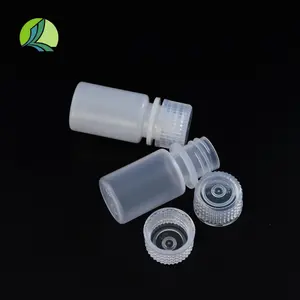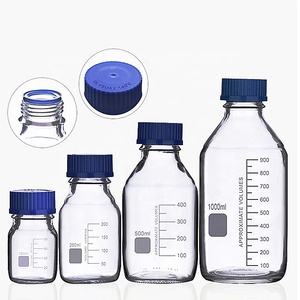What are Laboratory Bottles
Laboratory bottles are specialized containers designed for holding, storing, and dispensing various types of liquid and solid chemicals, reagents, samples, and solutions within a laboratory environment. They are an essential tool for scientists, researchers, and laboratory technicians who require precise and safe handling of substances during experiments and testing procedures. The design of laboratory bottles is focused on preventing contamination, ensuring chemical stability, and providing ease of use.
Laboratory bottles are typically made from materials that are resistant to chemical attack and thermal shock, such as borosilicate glass or various types of plastic like polyethylene (PE) or polypropylene (PP). These materials are chosen for their durability and non-reactivity with a wide range of chemicals. Glass bottles offer excellent clarity for visual inspection of the contents and can withstand high temperatures, while plastic bottles provide the advantages of being lightweight and less breakable.
To maintain the integrity of the substances they hold, laboratory bottles often come with specific types of closures such as screw caps, glass stoppers, or rubber stoppers that seal tightly to prevent leaks or evaporation. Some bottles feature graduations for measuring and amber or tinted glass for protecting light-sensitive contents. Laboratory bottles come in various shapes and sizes to accommodate different volumes and uses within the lab setting.
Types of Laboratory Bottles
The variety of laboratory bottles available caters to a multitude of applications within scientific research and industrial settings. Here is an overview of common types:
Reagent Bottles: These are used for storing chemical reagents or solutions. They typically have wide mouths for easy access and are available in clear or amber glass to protect light-sensitive reagents.
Media Bottles: Designed for storing culture media, these bottles often come with graduations to measure out specific volumes. They may be autoclaved for sterilization purposes when used in microbiological applications.
Dropping Bottles: Ideal for dispensing small quantities of liquids drop by drop, these bottles are commonly used in titration experiments or when adding reagents that require precise control over volume.
Wash Bottles: Filled with distilled water or other cleaning liquids, wash bottles have a spout that delivers a directed stream for rinsing equipment or cleaning off chemical spills.
Sample Bottles: Used to collect and store samples for testing or analysis, sample bottles must be made from materials that do not interact with the sample substance.
Boston Round Bottles: Recognizable by their rounded shoulders and cylindrical shape, Boston round bottles are versatile and used for a variety of liquids in both laboratory and commercial applications.
How to choose Laboratory Bottles
Selecting the right laboratory bottles is critical for maintaining the integrity of laboratory operations. When choosing laboratory bottles for commercial use, consider the following factors:
Material Compatibility: Ensure that the material of the bottle is compatible with the chemicals it will store. Borosilicate glass is resistant to thermal shock and a good choice for high-temperature applications, while certain plastics like HDPE or PP offer chemical resistance against corrosive substances.
Volume Requirements: Consider the volume of liquid or solid that needs to be stored. Laboratory bottles come in a range of sizes from small dropper bottles to larger multi-liter containers.
Closure Type: The type of closure can impact the security of the bottle's contents. Options include screw caps which provide a secure seal and are easy to use, as well as glass or rubber stoppers which may be preferred for certain types of samples.
Visibility Needs: For substances that require visual monitoring, opt for transparent or clear bottles. If the contents are light-sensitive, amber-colored bottles can provide necessary protection from UV rays.
Shape Considerations: The shape of the bottle might also be important based on storage space constraints or specific experimental setups. For instance, flat-sided square bottles may be more space-efficient on shelves.
Best Laboratory Bottles on Alibaba.com
Alibaba.com is a trusted marketplace where businesses can find a wide assortment of laboratory bottles suited for various scientific and industrial uses. What sets Alibaba.com apart is its ability to connect buyers with suppliers globally, offering access to a diverse range of products that cater to different requirements without geographical limitations. Whether you're looking for high-quality borosilicate glass media bottles with precise graduations or durable polypropylene reagent bottles with leak-proof screw caps, you can find suppliers on Alibaba.com who offer these products with options for customization support including OEM and ODM services.
By leveraging Alibaba.com's extensive network of suppliers, businesses can source laboratory bottles in bulk quantities ensuring they have ample stock for their operations while taking advantage of competitive pricing. Furthermore, Alibaba.com's Trade Assurance service provides buyers with peace-of-mind by protecting their payments until their orders are safely delivered.
In addition to its vast product selection, Alibaba.com is designed with user-friendly features like mobile purchasing capabilities and localized language support which streamline the buying process. This commitment to facilitating smooth transactions makes Alibaba.com an ideal platform for businesses looking to source reliable laboratory supplies efficiently.
Common FAQs for Laboratory Bottles
What materials are laboratory bottles typically made of?
Laboratory bottles are commonly crafted from materials like borosilicate glass, polyethylene (PE), polypropylene (PP), and high borosilicate glass due to their durability and chemical resistance.
Are laboratory bottles resistant to thermal shock?
Yes, laboratory bottles made of borosilicate glass are particularly resistant to thermal shock, allowing them to withstand rapid temperature changes without breaking.
Can laboratory bottles be used to store light-sensitive substances?
Amber or tinted glass laboratory bottles are available specifically for storing light-sensitive substances by protecting the contents from ultraviolet and other types of light.
What types of closures are available for laboratory bottles?
Laboratory bottles come with a variety of closures such as screw caps, glass stoppers, and rubber stoppers to ensure a tight seal and prevent contamination.
Are there eco-friendly options for laboratory bottles?
Yes, many suppliers offer eco-friendly laboratory bottle options that are reusable and made from recyclable materials.
How do I choose the right size of a laboratory bottle?
Consider the volume of the substance you need to store and choose a bottle size that can accommodate it, with a range of sizes from small dropper bottles to larger multi-liter containers available.
Can laboratory bottles be sterilized for microbiological use?
Media bottles designed for storing culture media can often be autoclaved, which means they can be sterilized using high-pressure saturated steam at high temperatures.
Are there customizable options for laboratory bottles?
Many suppliers offer customization services like OEM and ODM, providing options to tailor laboratory bottles according to specific business needs.
What is the purpose of graduated laboratory bottles?
Graduated laboratory bottles have markings indicating volume, which is useful for measuring out specific amounts of liquid without the need for additional measuring equipment.
How do I ensure the chemical compatibility of a laboratory bottle with my product?
Check the material specifications of the bottle against the chemical properties of your product to ensure that there will be no adverse reactions or degradation.
What are Boston Round Bottles used for in laboratories?
Boston Round Bottles are versatile containers that are used for storing a variety of liquids in laboratories and may also be used in commercial applications due to their rounded shoulders and cylindrical shape.
Is it possible to have surface handling features on laboratory bottles?
Yes, surface handling features such as screen printing, hot stamping, acid etch, and decal can be applied to lab bottles for labeling or branding purposes.
What should I consider when selecting a wash bottle for my lab?
When choosing a wash bottle, consider the type of solvent or cleaning liquid it will contain and ensure that the material of the bottle is compatible with that substance.































 浙公网安备 33010002000092号
浙公网安备 33010002000092号 浙B2-20120091-4
浙B2-20120091-4